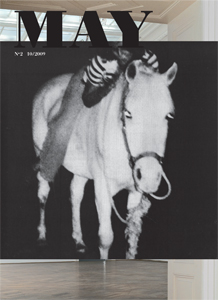Magali Arriola,
Riding out of the Sunset, or: How to Cover
the Sunrise with a Thumb in Guantánamo Bay /
Dork Zabunyan,
Heterotopias: Pragmatics /
Catherine Chevalier,
Event/Non Event –
Merlin Carpenter at Gallery Dépendance /
Juliane Rebentisch,
Installation et intervention /
Anthony Elms,
“Do you work hard? Do you try hard? You don't.
Chicago, now!” /
Bruno Serralongue,
Series Calais, 2006-2008 /
Gallien Dejean,
« Effleurer des zones dangereuses rend réel l'intervalle
entre évasion et attraction. » – « Les objets dangereux sont des lieux séduisants à vivre. » /
Seth Price,
Teen Image –
Teen Image /
Retour en terrain inconnu (discussion : Thomas Boutoux, Catherine Chevalier,
Benjamin Thorel et Patricia Falguières,
Elisabeth Lebovici,
Natasa Petresin) /
Lili Reynaud-Dewar,
Tarzan ! ou Rousseau chez les Waziri –
Musée du Quai Branly /
David Lewis,
Une Semaine de Bonté,
or Introduction to the Reading of Hegel /
Elvan Zabunyan,
Sans Elles –
Ou quelques remarques sur l'accrochage
des artistes femmes au Centre Pompidou /
Jay Chung,
Paper Trail: Do You Love Me? at Kunstverein Munich /
Karl Holmqvist,
Danh Vo at Kunsthalle Basel /
Limited Edition:
Heimo Zobernig.
Carrying on from the first issue of the magazine, with its focused on the question of critical forms and means available today, by way of writing in particular, the second issue of May develops the matter of other spaces, inviting the reader to "pursue [their] description" based on the contributions gathered there.
Editorial, p. 17
Launched in 2009 in Paris, May revue examines, once or twice a year, contemporary art practice and theory in direct engagement with the issues, contexts and strategies that construct these two fields. An approach that could be summed up as critique at work – or as critique actively performed in text and art forms alike.
It features essays, interviews, art works and reviews by artists, writers and diverse practitioners of the arts.



